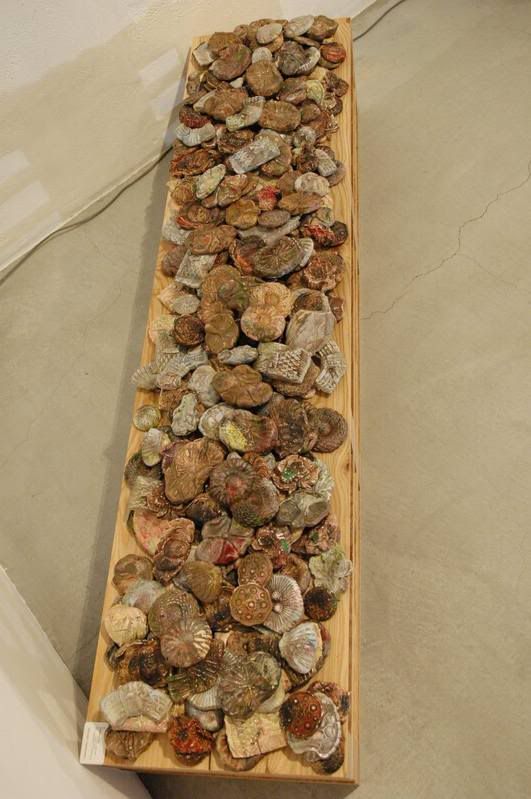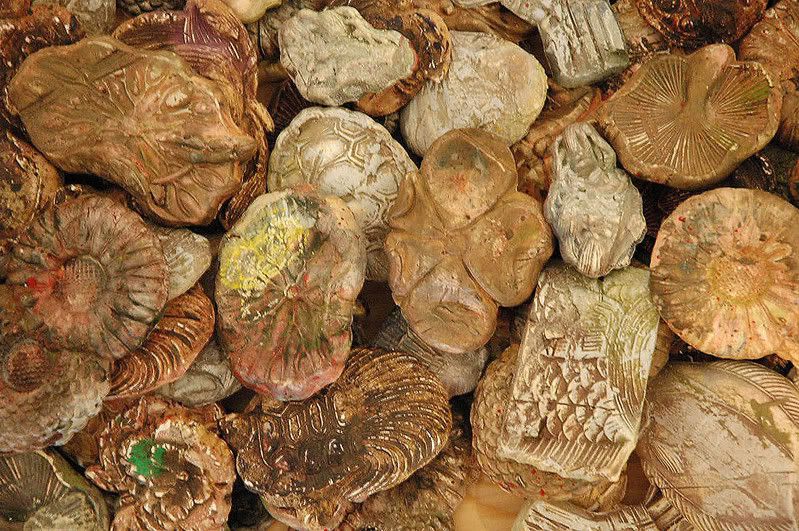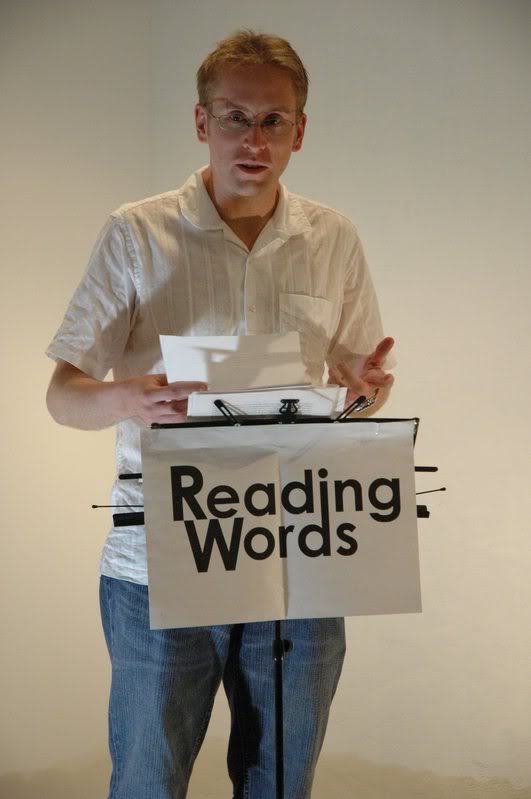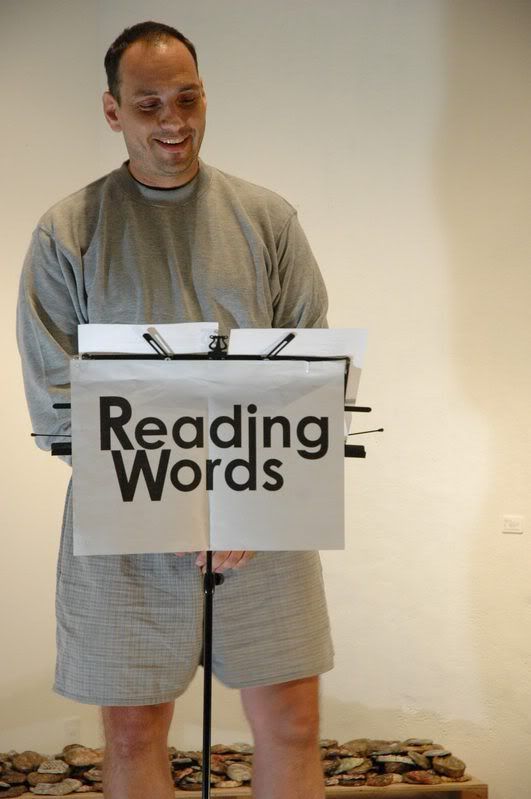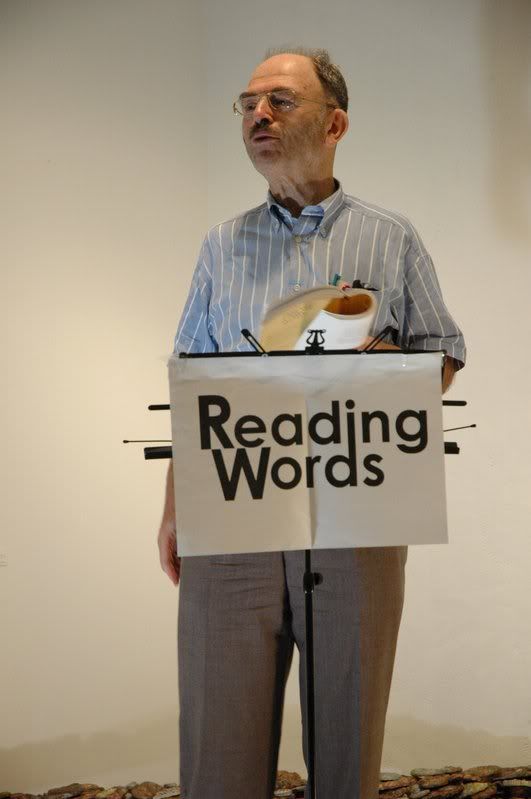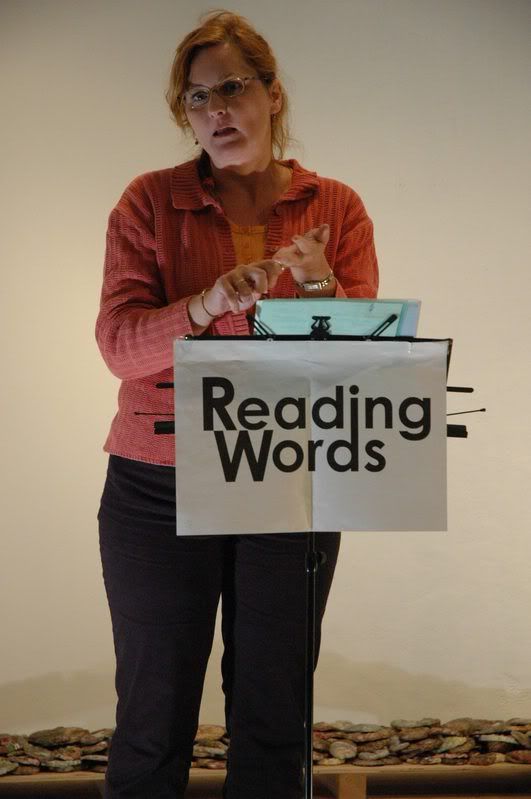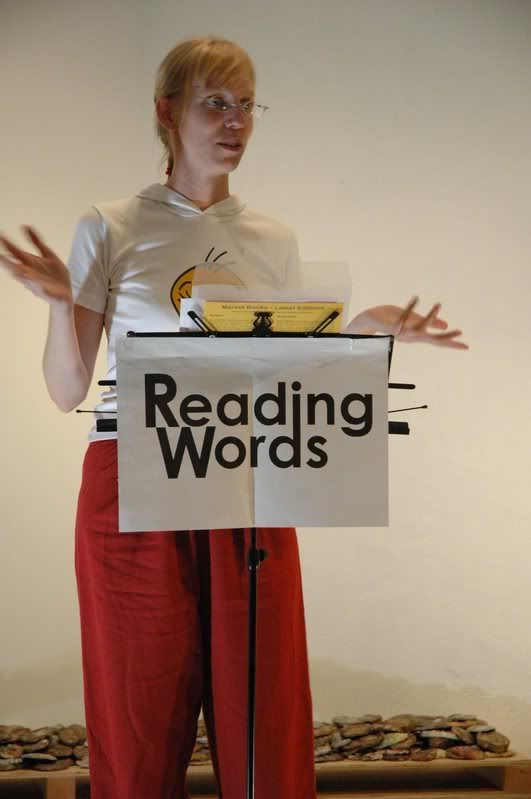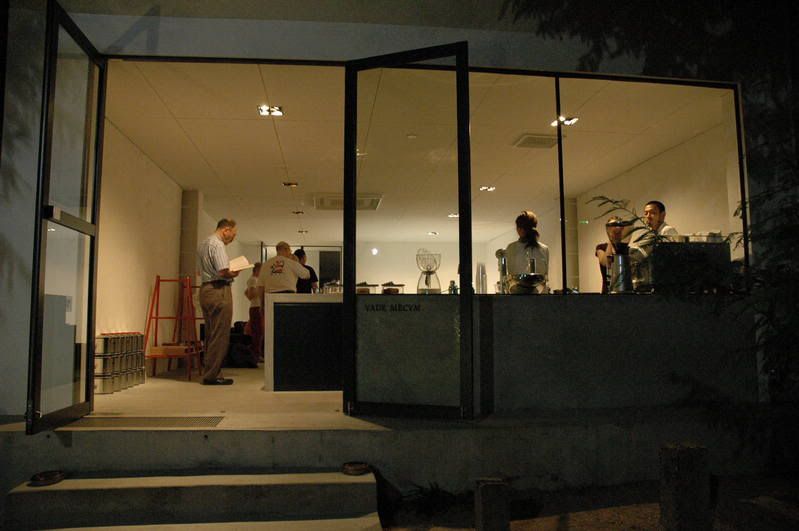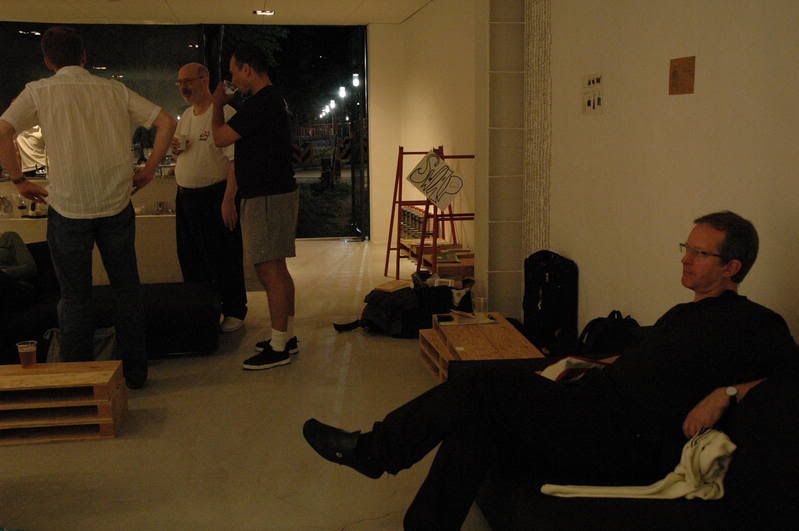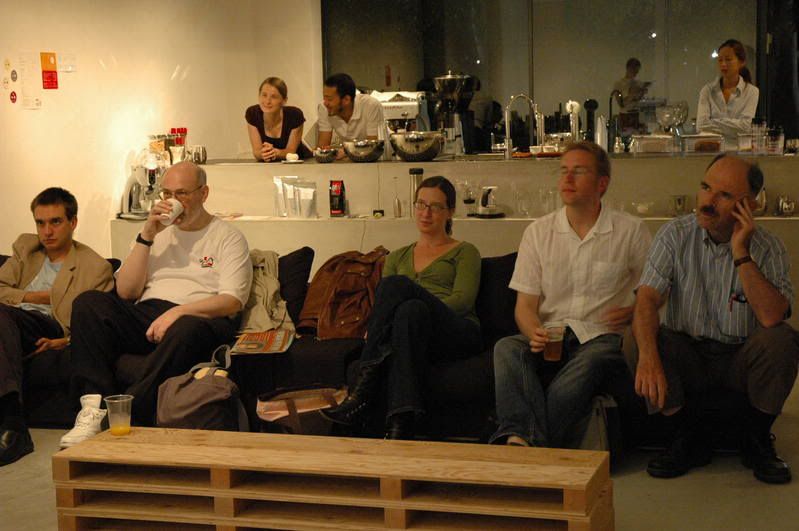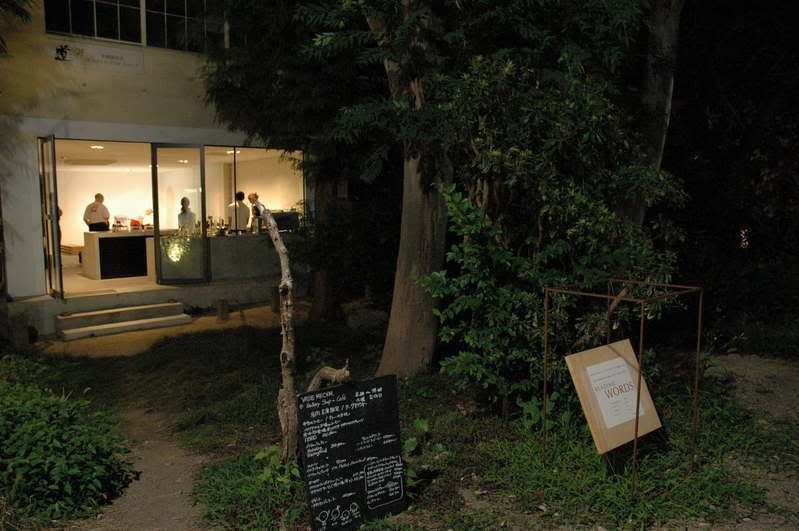Thursday, September 28, 2006
Other Readers (9.24.06): Kevin Keane
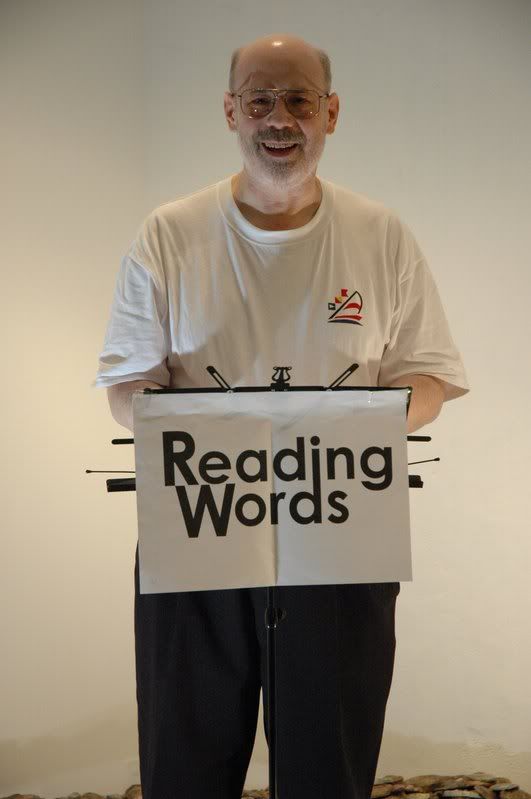
Fade
forgetting sycamore
on grassy plains
names and numbers
snatched by the wind
forgetting popcorn & Clark Gable
laughter on tricycles.
belting out “School Days” on pianos
and driving miles to nowhere
quacking at strangers--
faces sinking into the brain
but the smiles remain
Finale
turn the knob, enter--
last time to learn how fast
clouds sail across the sky
look at this hoax of a life--
waiting in a white room
for the end of the end
take a final drag
the phone rings “you're up”
on stage the applause rings out for
that last cakewalk to the stars
Sunday, September 24, 2006
Jerry Gordon (9.24.06)
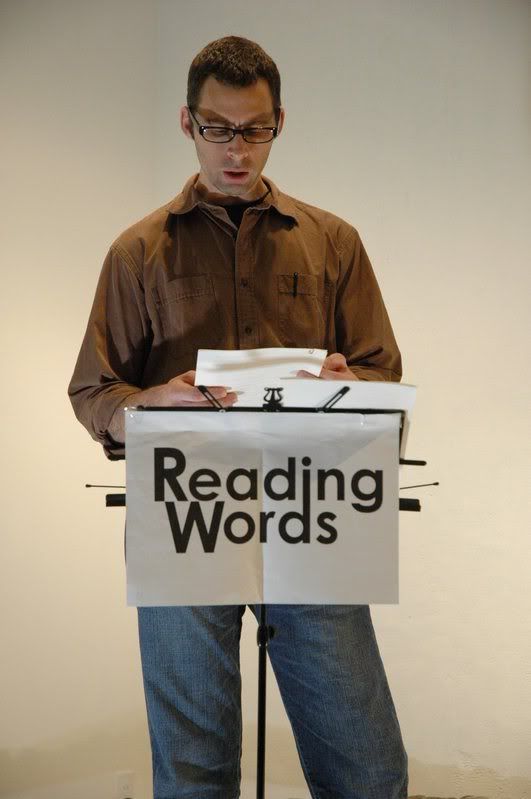
The Bazaar
As a scholar who travels through foreign lands, I am always suspicious. I find it is physically healthier to be so. I don't listen to proclamations about miracle cures or celestial orgasms anymore. It is also just a good idea, in order to keep an appropriate distance on events, in order to observe and see them as they should be witnessed: in the third person. But, I can recall one occasion when I cast off my rule and let myself be drawn in by the local color, when I was intrigued and captured by exotic and secret beauty.
The country was a small one, which I shall keep anonymous as it no longer exists by the name it did and because the faction currently in power may read threat in the most benign of my observations. (I enjoy plane travel far too much to go into hiding.)
I was wandering, pulled by my sense of sound and smell through the market in a town on the northern outskirts of the capital. It was crowded with people, some in simple or religious dress, and others in black leather sport jackets with elaborate gold embroidery down the sleeves and across the backs. At first, from the violent images of birds tearing at tigers, and bulls goring snakes, I thought the jackets were the uniform for the then growing political faction that later took over power and now rules. But, I later learned that they were rooters' jackets for the country's five-team soccer league.
An international constant: the fanaticisms of political power will never match those of professional sports.
The busy market was a labyrinth of corners. On a daily basis, the makeshift shops--which had been erected in temporary fashion for the past two thousand years--transformed the stone-paved square into a tight crosshatch of foot-worn pathways. Some stands sold polyester shirts or belts or items to make the daily chores of living easier. (Whatever the chore, in whatever the country, a shopkeeper has a thing that will make effort vanish. Market capitalism's perpetual motion machine.) But these types of use-items never interest me. As a traveler--a man abroad--I buy only for the moment. Waste is the fuel that drives me. I don't come to the market to purchase anything. I observe and feel. I come to watch the culture in rhythm, to sense the pace and beat. I measure and thumb the weight of the cloth, but never to buy. I am there to note the rituals in a small book.
As I turned from one row onto the next, the market was a blanket of heavy murmurs. People moved and I moved. As a mass, we stroked the tattered strips of rough, grayed fabric that hung as walls for the shops. From the outside, each stand was a duplicate of the colorless next. But when the wind blew a heavy canvas doorway aside, I could see the colors and clear sounds of life glowing within . Each had a different hue and pitch. The laughter of fruits and vegetables was common. It was a familiar tone and had brilliance. A pear here was as a pear there and at home. Carrots were piled in balanced clumps on their stems and seemed to lick like orange flames igniting and churning from the ground.
It was visually exciting and, to its favor, produce is usually secure. You can most often trust vegetables. They make few assertions or promises.
But, as I continued my stroll, I entered the area where I am always most leery. This is where men shout in a song-like chant while waving a sample of something in their hand that you must buy in a taped box. This is the zone of trust and persuasion.
The first stand to catch my interest was no more than a small Formica table. Upon it, a man had twenty four household glass jars lined up from one edge to the other. They ran in rows of eight. And, in each jar, supposedly, the breath of the devil was contained.
The man--the seller--was dressed in dirty polyester slacks and a leather jacket with a large gold dog licking its paws over a pile of 12 bird carcasses. He told his story as a convincing narrative of fear. His voice had a style that seemed particularly fitting considering the nature of his product.
"The devil is not dead, as we are told to believe. I have spoken with it, face to face, and know that it's very much alive and real. Its breath smells of sulfur and garlic. It is an awful smell. This I swear to you."
As he spoke, sitting behind his layers of glass, he gripped the edges of the table and rocked from side to side with his eyes closed. He went on to tell of how he had been ill for a long period of time and that his family would routinely put him in a small room while they ate dinner. He said this was understandable because his illness was, "the kind that ruins people's appetites." He didn't name his illness in any more detail than that, except to say that it was very serious and that his doctor had given up hope of his survival.
He went on. One night while in isolation with his family eating on the opposite side of the door, he said he called at the ceiling to whatever power “either of good or not of good” (his exact phrasing) that could cure him. Soon after his plea, he said he heard a scratching of hooves on the concrete floor of his room and could feel the sulfur and garlic breath of the devil moving across his face in the accelerated pants of a heavy smoker. The man said:
“The devil spoke very softly, very different than the devil in the movies"
But, he said that the devil did not ask for his soul or for the souls of anyone.
"The devil does not want more souls. It wants space. It wants to buy cheap land. That is why I am selling these jars of breath. I must sell breath for the devil because it saved my life. But, you only have to pay for the breath and can then enjoy its benefits. There are no other obligations for you. I promise you this is the truth. No obligations.”
As I was intrigued by the notion of the devil giving up his traditional role as the tormentor of souls for the chance to own property, I stayed and listened to the questions that always follow such a hawker's pitch.
"Did the devil show himself to you?" said a man whose pants were tightened around his waist by a chain of rubberbands. "How can we be sure this is really the devil's breath and not your own?"
"If it were my own, wouldn't I be able to make more than 24 jars?" responded the man.
This seemed to still the crowd in a moment of reason-weighing. I could hear the scales of logic balancing level in about half the onlookers. The others left. The questioner nodded and heeled closer to the table. And, when he bent forward to stare into the breath-filled jars, I noticed the beautiful head of a woman tilt intently around the corner of a ragged stand which sold mirrors cracked by the king in a fit of vanity-anger.
But she was not interested in the devil's breath; she was looking at me.
At first I was spooked. I do not cut through space in the shape of a man who such women lust for. I have long accepted this about myself. But such a look from such eyes from such a face has the power to disfigure even my long held mental self-image of a comfortable grotesque. Her eyes reflected possibilities I am still incapable of imagining on my own. She inspired the irrational. And she was what caused me to set down my scepticism, for a moment, and trust in beauty. To pursue a thought unquestioned. To desire.
I moved to meet her, but she bolted behind the canvas corner. I followed. I did not wish to appear in chase, but I feared the distance her flight could lay. I picked up the pace of my walking. I moved as though I was trying to reach an empty seat on a train. Not exerting myself, but gliding towards an immediate fixation. But she was gone, dissolved within the current of moving fabric which flowed as a dynamic surface of nape and weave. Lost. Into the blur of texture and ache of shadowed folds.
I knew she could not have gotten too far. It was too crowded to cover a large distance in such little time. Besides, I trusted her interest. I hoped.
As I worked my way around the area, spying corners without turning my head, absorbing the scene with peripheral sight rather than focused vision, I overheard a man trying to guilt his wife out of buying a book at a nearby stand.
"You always say you will read them, but they sit in a pile next to your chair with only the first twenty pages rustled. But, if we buy the lucky spell we don't have to do anything. It works on its own."
"But this one is important for both of us. You will want to read it. I know you will appreci. . ."
They sensed that I was eavesdropping and moved to a more private corner, out of my hearing. But, from their movements and hand gestures I could tell that they were striking a deal. They were promising to change bad habits for each other in order to get what they wanted. Perhaps their wishes did come true. Before they paid their coins, perhaps they created their own magic.
They moved away from the frayed grey wall and I followed them with my eyes. The wife led the way to a small stall where the canvas flap door was tied up to accommodate the almost constant flow of customers.
"Moses was a juggler!" the man in the entrance way chanted, "I can teach you to beat him at his own game!"
I wanted to stay and over hear more, but I knew he would not divulge any secret. He would only make claims and cite examples. I strolled on without direction. I tried to pick up the beat of love in the air and unconsciously move in that way.
It worked in under five minutes.
As I widened my hearing, listened larger to the music of the bazaar, I lost track of the thing I was pursuing. I let myself go and then she came. I was rounding the edge of a young child's begging basket when the woman whispered to me from my left. I turned. There was her beautiful face smiling at me from the alleyway between the only two permanent buildings in the square--the national bank and the brothel.
I moved without hesitation. I smiled and kept her eyes locked with mine. She waited, but then bolted down the alleyway. This seemed odd, but I was out of the pale of scepticism. I was breathing on trust. I lunged for the corner as to not lose sight of her. And then, I saw her all. I saw her contorted, monster-like shape fleeing.
She limped and moved in a rhythmic bowing motion away from me. I ran to catch her. She was deformed, but could still outrun me. She could lure me. Willingly.
She stopped in a small sun-hidden alcove formed by where the bank and brothel come together. There she halted, panting her false exhaustion. That was where her trail ran out, where I caught her. Or, where she caught me. I came to the spot soon after her, out of breath and damping my shirt with exercise. And, then I was able to see her clearly.
Her beautiful head was perched atop her wind pumping throat at an awkward angle, fixed like someone looking for something they’ve dropped to their left. Her features were delicate and clear, a shining edge smoothly defining each bend and transition. A cleanly worked softness and surface, hopeful evidence of some aesthetic tooler forming corners of the world as a way to make we who read deeply in Darwin leave room in our thesis for the irrational. A head of grace.
But, her body was bent and twisted as though at some age a force peeled her skin down off her skeleton, tied her spine in a knot, and then redressed her bones in a haphazard impatience.
She stared at me. She worked to calm her breathing. I, with my skin chilled by the shade and my soaked waist-band, hoped she would keep up her pumping; I selfishly wanted to hear her speak in a pant. It would have been stimulating.
And then, suddenly, I felt my heart heave in a strange skipping rhythm. I wondered if it was a sort of love-effect or a by-pass surgery anecdote. I leaned against the dusty sandstone wall. I began to kneel and to move my hand to my chest when she started towards me. I stood up, for unexplainable reasons. She motioned for me to come to her. I did. She motioned me towards her mouth. I moved, looking and imagining futures which I as quickly forgot. Her lips were thin and unchapped. "A dreamer's paradise," I kept thinking, but I don't know why.
Then, with her lips filling my vision, she peeled them back, like a set of odd stage curtains, to show me a mouth of perfect teeth. White and straight and cap-less.
I thought for a moment, in a brief clutching back at the sensible blankets of reason, "Is this what this is all about? She's proud of her teeth?"
But then The Event occurred. The event which was only possible to witness in a state of semi-imagination. She opened her mouth, spread her teeth apart like a pair of gates set to hide the sublime. And there, in her throat, were spoons.
Five chrome spoons were lodged in her throat, placed in a row of descending size from left to right. I stared, lost for a reason. Lost for thought. Lost in the repetition of my own convex reflection in the dim light of her mouth. I couldn't move. I froze with the heels of my hands wedged against my knees and stared. Amazed and marveled.
But, then I noticed that her mouth and lips were drying out and I returned to my senses. I straightened back up and said, "Hmmm."
I felt odd and awkward, not knowing what to do next. Should I ask her questions about the spoons? Should I pity her or act like they don't change her beauty in any way? Should I run away or pay her something?
But then she started. The spoons were not just some kind of cultural punishment or tribal beauty accessory. They were an instrument. She began to exhale in a smoothly controlled and practiced manner. A thin line of air exited her mouth and with it came a tune.
She played on, and as I listened I caught the melody. It had power and passion. Much more than I can still even imagine could be possible from stainless-steel cutlery in a woman's throat. It was a warming rendition of the Star Spangled Banner. The acoustics of the alcove seemed perfect. It would have brought me to my feet if I weren't already standing. I listened, and when she finished I applauded, alone, the percussive cracks of my hands echoing in the alleyway.
I tried to pay her, as I would a musician with an open case on the street, but she would have none of it. She wanted action rather than my cash. She hadn’t simply picked me out of some bazaar crowd; she had chosen and stalked me and she wanted my help because of the access I had and that she was denied of--her being a native in a country where only foreigners can use the hotels.
In a very rehearsed speech she laid her case bare to me. She wanted me to smuggle a spoon out of the hotel restaurant for her. A tiny demitasse spoon. Chrome finished and industrial was best. She explained the entire thievery in relation to it being able to expand her range and repertoire. She said she would then be able to play more show tunes and classical pieces. Perhaps even compose. I felt rather like a patron, and I agreed.
When I gave the young woman the demitasse spoon, she examined it closely as we stood beside a brown metal dumpster behind the hotel. At this same time, I gave her my address at the university and told her to please send a recording if her career ever came to that. She shook her head without looking up and said that music must be lived, not held on to. I nodded, although I did not really agree, and have not heard from her since.
Charade of Destiny
I live between my work and worry,
and learn of worlds released from windows
at each turn I take within these rooms of bruising dreams,
these abandoned factories where my muses loom
up near the sooty ceilings, squealing
in their paper cages like lightless lanterns
swinging high as bitter chariots of cries
guiding me on into darkness and one more lost home.
The ringing ringing ringing of the phone
going on beyond the wall I call my own and the lung-rung
echo that chokes me in my nervous sleep, smokes
out the humming hive of my heart--vacant of all bees--
the bleepity-bleep beat that pulses of another pleasing hoax.
Swing low, swing low, swing low sweet charade of destiny.
Remind me of that look you loosed into my eyes,
that crooked face of history you used to hide
the mystery you took with you,
back into the far side of the mirror.
Waking Ourselves from Death
The sky is torn from mountain tops
and we sit here and hold each other's eyes.
The lies we keep to keep ourselves
asleep and tempered with this tenderness.
"God bless. God bless." I've seen you
when at rest and I believe the knowledge
of your lips. Believe the multi-layered glimpse
we live. Believe this brutal brevity. Believe
the width of every dream,
and the doubt it textures. Conjecture. Conjecture.
I paint the city walls with all the whispered names
for no one, let the bluish-black acrylic
flash across the night, peel the screen of heaven down
to blanket all our beds, the quiet of the house of lead.
The dread. The dread. The river of what's said.
The storm clouds on the morning of the light
that bathed your head. The bird song in the warning
of the city where we met. I said you said it's said,
our hands are always open, open to what's left,
open to receiving every drop of word that's read.
Believing each deception, because we're fictional at best,
but leaning out to kiss you, kiss you on the head, kiss you
on the neck, kiss you in this moment
when we wake ourselves from death
as a way to not forget.
What’s this?
"There is more on heaven and earth, Horatio,
than is dreamt of in your philosophy."
--Hamlet
I name people pedestrians for walking,
and lazy for sitting, and you
beautiful for your rigor in organizing yourself
in black and white.
And the boy, he’s rude
for stinking up the train
with McDonalds’ smell and noisy wrappers.
But this is only helping me
to see what is merely human.
This is not bringing birdsong to my ear
with all its secrets on silence.
From the air
I pick a part and say, “Skylark.”
“Crow” or “Jay.”
Limiting things to what I think they are,
I comb my hair
like the picture in the mirror.
Mirror
Each time I face this dusty pane
it feels like I must
take up the tools of memory
and carve my portrait
from this rectangular ocean of chrome.
The duty to make a me
along some semblance of self
and in that cut and file the world
to make sense as what I see.
I imagine the ease of one day
freeing the dust of form,
of simply meeting the beast
without name, arriving unrecognizable
amidst the evaporating droplets
of chromium rain.
Edges
At the edge of here is there and at the edge of far is near and at the edge of lost is found and at the edge of free is bound and at the edge of day is night and at the edge of wrong begins the predictable edge of right and the edge of left which is at the edge of get and get is clearly on the edge of coming, which is on the edge of impotent which is at the edge of strong but also on the minor edge of simply going on and on and on and at the edge of that is this and at the edge of strife is bliss and at the edge of land is sea and at the edge of all is me, or at least that's what it seems to be when I rub up against this everything that I can see and sniff and fondle with these numby nubs I get for life to use to sense the edges that all seem to stretch out from each seam into the far off edge of my periphery. And attheedgeofwordsis space and at the edge of Osaka is another kind of place and at the edge of hope is doubt and at the edge of smile is pout and at the edge of love is pride and at the edge of hell resides acceptance of all things, a little garden from which springs no manner of distinctions so the edges vanish too and you are you but also the whole zoo of odd rectangles in the mangled angles of the all in one not under and not over any edge of any sun. I'm done, but just begun.
Patrick Widdess (9.24.06)
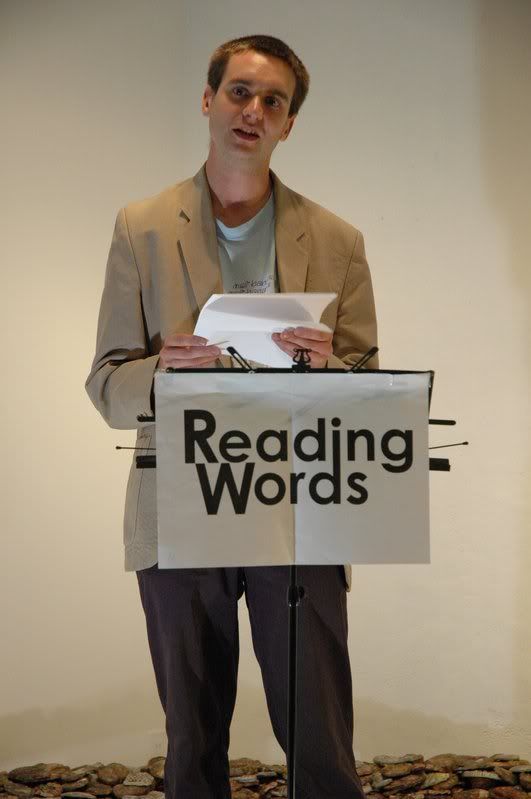
The Sound of One Leg Walking
I am woken every morning
by the purposeful stride of a well-made shoe
swiftly passing my window.
Each step sounds a click,
sharp and steady as a metronome.
The alternate step is as pronounced and punctual in
its absence,
a silent echo to its heavy soled counterpart.
One time I woke early and wheeled myself to the window
but dozed off,
waking just in time to see a leather clad heel vanish
round the corner.
Chinwags
Chinwags perch on the rose bush,
their nattering song rises with the morning sun.
Watch them hop amongst the long grass,
looking for gossip to feed their young.
Michael Crowe's blog http://www.figcrumbs.blogspot
Saturday, September 23, 2006
The Challenge (9.24.06)
And, the September Challenge is: Rhyme Schemes
Below are six pairs of rhyming words. The challenge this month is to use these words in a poem. You can rearrange the rhyme pattern however you like. You are free to write a poem using the words as rhymes at the ends of lines, or get more creative and surprising.
Rhyming pairs:
turn last look
learn fast took
hoax rooms phone
smokes looms own
Below are six pairs of rhyming words. The challenge this month is to use these words in a poem. You can rearrange the rhyme pattern however you like. You are free to write a poem using the words as rhymes at the ends of lines, or get more creative and surprising.
Rhyming pairs:
turn last look
learn fast took
hoax rooms phone
smokes looms own
Patrick Widdess (8.27.06)
Improbable
Against odds of more than 99 trillion to one
a man fell against a wall whilst drunk
and passed straight through.
He awoke hours later unable to remember how he got
there.
These things happen all the time.
Fish rise from the sea bed to quote chapter and verse,
Corpses re-awake briefly in the morgue when no one's
looking,
The car keys you thought you lost turned into a clump
of moss
you never noticed wasn't there before.
These things happen.
So why marvel when a prophet's face appears in a fish
finger
or long lost relatives are seated together on a plane?
In Russia scientists have dummies propped against
walls,
and furniture sealed in rooms under surveillance,
waiting for it to move, change shape or combust,
waiting for that moment of improbability.
And when it comes they will know no more
than that man who went home to nurse his head
and never found his phone,
which fell from his pocket on the other side.
Friday, September 15, 2006
Kevin Keane 8.27.06
Advent
June day: glimpse the moon
in pine shadows.
wait—and the white orb
will roll up the stairs
of the sky
Invitation
after a pas de deux
with the wind, the lavender
beckons to me with its
delicate perfume
The End of the Baileys
Jack and Jill went up the hill
to fetch a pail of water
I journeyed to the many
countries of your breath
slept in the verdant
cities of your eyes
but your hands a desert
have buried me in sand
our distance an inland sea
“it’s not that I don’t love you”
(how do I hate thee?
let me count the ways)
“then why don’t you stay?”
(but to stay is to ossify—
a volcano, extinct)
Jack fell down and broke his crown
after the mountains
the road to the forest
of your heart is tangled up
with vines here in the
lowlands of our fear
and Jill came tumbling after
June day: glimpse the moon
in pine shadows.
wait—and the white orb
will roll up the stairs
of the sky
Invitation
after a pas de deux
with the wind, the lavender
beckons to me with its
delicate perfume
The End of the Baileys
Jack and Jill went up the hill
to fetch a pail of water
I journeyed to the many
countries of your breath
slept in the verdant
cities of your eyes
but your hands a desert
have buried me in sand
our distance an inland sea
“it’s not that I don’t love you”
(how do I hate thee?
let me count the ways)
“then why don’t you stay?”
(but to stay is to ossify—
a volcano, extinct)
Jack fell down and broke his crown
after the mountains
the road to the forest
of your heart is tangled up
with vines here in the
lowlands of our fear
and Jill came tumbling after
Kent English 8.27.06
Why I want my money back
These shoes are, in fact, too comfortable.
They fit me too well and give too much support.
I have worn them in overly air-conditioned office settings
and the frightful heat of Death Valley.
They were on my feet when I traversed
the full length of the Great Wall,
and when I sat through a marathon performance
of Der Ring des Nibelungen.
Not once have I had a blister
or even so much as an itch.
No pebbles or grass seeds have found
their way inside, and I have so far failed
to step anywhere near sticky wads of pink bubblegum
or malodorous piles of dog shit.
In short, my feet have never been happier,
and I can stand it no longer.
They are missing out on all that I am experiencing,
locked away, as they are, in their well-crafted euphoria:
they have been cheated of the discomfort that
makes a Good Shoe Day so rewarding.
I think that in view of what my feet have not been through,
I am entitled to a full refund or at least an exchange
for a pair less pleasing to the instep, one that chafes
my little toes or causes cramping after six hours of wear.
Surely it is not too much to ask; after all,
I have but one set of feet, and I would like to feel
that we are walking along the same bumpy road.
GALATEA
Chapter 2
The moment of Galatea's conception took place months earlier, when I came across a rack of red silk shirts in a second-hand clothing store downtown.
Red is not usually my colour: I'm more of a blue or green kind of person (I'd estimate a good 87% of my wardrobe could be classified under those two trusty headings). But there was something alive about those shirts, an immediacy and vitality that demanded my attention. As I examined the multitude of shades, the colour bled from everything else in the room, and it was as if I had suddenly been transported into a Chagall painting: just like his bouquets, the hues were not confined to the shirts themselves, but like scents could drift up into the surrounding air, creating a soft aura that grazed my fingers with its warmth.
I'm not sure how long I stood enthralled, but the enchantment came to an abrupt end when a feral and apparently myopic five-year-old ran headfirst into my ass, knocking me into the rack, which, mercifully, did not topple. Once I had recovered my balance and what remained of my dignity, I took out my wallet to see how many shirts I could immediately afford. It turned out that I had enough for seven of them (actually I only had enough for six—they were each three dollars and I only had two tens in my wallet—but the cashier kindly took pity on me and my poor arithmetic skills), so I selected a range of shades: terracotta, cerise, cardinal, crimson, alizarin, carmine, and burgundy. At home I laid them out on the sofa—four along the back, three on the seat—and for a long time just sat staring at them, hoping to discern some meaning or feel the cattle prod of inspiration. None was forthcoming, though, and ultimately I had to fold them and find a space for them in the warm-colours drawer of my dresser.
Following that night of seemingly vain contemplation, the wisp of something beguiling began floating through the back corridors of my mind, growing in persistence by the day, but refusing to take on the weight of an idea or image. When I closed my eyes this nascent form would tease me with its presence, allowing itself to be sensed without ever coming into focus. It remained veiled behind curtains of gossamer, and each curtain I managed to pull back only established the existence of more curtains. A week went by and I was becoming agitated by its undue modesty when without warning or the travails of labour, its gestation abruptly ended and out popped Galatea in her larval stage.
What induced this birth was the sad sight of a squirrel that had met its end under someone's unswerving tires. I normally try to avoid looking at such things—they engender a nauseatingly strong compulsion to wash my hands—but the colours spilling from the poor creature's torn belly gave sudden substance to the wisp that had been eluding me: entrails—that's what lay behind those curtains, that's what was drifting ghostlike through my thoughts—a shimmering pile of red entrails. I must have said entrails aloud and with some volume because the pair of women approaching me and my muse, the squirrel, gave little gasps of disgust and quickly moved to the opposite side of the street, looking at me as if I were poking the thing with a stick instead of standing a respectable five feet from it, with my hands clasped tightly behind my back. I admit I was likely displaying a madman's grin that even their reaction couldn't diminish. I felt like I had just found a Rosetta stone for the intractable hieroglyphics in my head. So where normally I would have had embarrassment descend on me like a five-hundred pound hawk, my glee was such that the hawk passed me over, and I was all the more elated as a result.
Any free time I had during the next few days was spent with a notebook on whose cover I had carefully inscribed Entrails in my best approximation of calligraphic script. On its vellum pages (I am rather particular about the notebooks I use) I sketched, brainstormed, theorized, speculated, doodled and entered anything that I thought relevant to the project I had suddenly found myself undertaking. (At the time it did not occur to me to ponder why I was suddenly so obsessed with red silk shirts and entrails. I was too preoccupied with the temporary freedom it afforded me from the anxious thoughts that normally paraded through my skull—distracting and paining me with their apocalyptic fanfare—to bring my motives into question. Good thing, too, for had I given the germ of suspicion the chance to sprout, it would undoubtedly have ensnared me in its vines and kept me from accomplishing as much as I did in that week of scribbling. I have an unnaturally strong inclination towards procrastination that it is generally triggered by precisely that kind of self-doubt.)
What eventually emerged from those pages was a rough plan for a patchwork coil of silken entrails, the seams of which would be sewn with long strands of dried grass. Dried grass would also serve as stuffing to give girth to the intestinal loops—I could hardly have allowed my entrails (for they were not yet her entrails) to appear deflated. Looking back I cannot say with certainty what gave rise to the grass idea. However, in the margin on the third page of my notebook there is a rather out-of-place drawing of the wishful trio from The Wizard of Oz, and I suspect the Scarecrow may have had something to do with it. All scarecrows are creatures of pretence: feigned humanity in a farmer's field, feigned harmlessness in B-grade horror movies, feigned Hippocratic integrity in the Batman series, feigned ignorance—or so I believe—on Dorothy's adventures. It would not be too much of a stretch to add feigned irrelevance in a discreet corner of my Entrails notebook. I of course cannot be sure that he served as the inspiration, but I think it's a fair assumption.
It was late summer when all of this took place, so there was long grass to be found if one looked in the right places. I began gathering a few stalks here and there—next to a phone booth in the A&P parking lot, hiding in a churchyard hedge, poking up through the cracked cement at around the side of my building—and hung my paltry sheaves to dry the way I had seen others dry roses (in retrospect there was no need for me to have hung them upside down, it's not as if there were delicate petals to be preserved). It was a slow process as so much of the grass I found was coated in a film of filth too thick to be acceptable, so it seemed like I would have to go out of the city if I wanted to collect enough grass before winter set in. Fate decided to intervene on my behalf, though, and plant in my head the unorthodox idea of taking a different route home from work. (At that point I had a part-time job in a specialty food store, stocking shelves and operating the cash register. I quit after a few months because a) the carrying of large boxes of lentils and fair-trade coffee beans was giving me unbearable lumbago, and b) the building was old enough that I feared its thick walls contained asbestos, which, with my suspected lung condition, I obviously did not need to be inhaling.) After about a week at a new job I have usually determined the optimal way to get there and back, choosing of course the shortest path which avoids any potential hazards (overly busy intersections, areas under construction, old trees that appear ready to fall, et cetera) and keeps me in the shade as much as possible, as I am quite fair and have a number of suspicious moles. In the first week of September, on a particularly beautiful evening—perfect windbreaker weather: slight breeze, the sky a deepening cerulean—I felt an urge for adventure and decided to go home by a circuitous and previously untravelled route, in spite of the risks involved in entering unknown residential areas. After a pleasant but not overly exciting journey, I ended up a few blocks south of my apartment building. I had been to that part of the street before, just not recently. As I strode home, I happened upon a construction site that didn't look any different than it had months earlier, as if the project had been put on hold or perhaps abandoned completely. A two-meter high chain-link fence surrounded a roughly gravelled area the size of three standard lots. There was nothing to indicate for what manner of building the site was intended; apart from two piles of gravel and a pile of what looked like clay, there was nothing behind the fence but weeds—weeds and long grass. The grass had sprouted up in patches where the layer of gravel was thin or negligible and also grew all along the length of the fence. I was so excited I believe I may have clapped my hands or clicked my heels: I certainly did something that drew strange looks from yet another pair of passers-by. (Am I really the only person whose thoughts occasionally exceed the mind's escape velocity and manifest themselves outwardly?).
At the time I had no way of knowing how much use I would ultimately make of that abandoned construction site, all I knew was that I had inadvertently discovered the mother lode of urban long grass. I hesitated, unsure whether I should take an armful home with me right away or come back when I was more properly attired for the task at hand: I was still in my work clothes and carrying a bag of groceries. It seemed fitting, however, that I should take a token of my discovery with me, so I walked along one side of the fence to select a few of the choicest strands—tall, straight, unblemished by disease or excessive grime—and found that choosing the best would be far from easy: it was all marvellously well suited to what I had in mind, or at least thought I had in mind (if such as distinction is possible). Again I likely let out a yip of glee. Almost at random I picked ten plants, taking care not to damage them in any way; I had not yet determined how I was going to sew with grass, so I wanted to keep my supply in the best shape possible. I had begun carrying around a small pair of scissors for just that reason; trying to pull it out by hand resulted in a) a damaged specimen, b) my hands being cut, or c) both, which was by far the most likely outcome. I snipped them off just above the root, low enough to keep all of the slender leaves, but not so low as to get any of the root structure and its entourage of top soil.
With my little bundle I began walking home, pleased with myself for what I chose to view as my resourcefulness (although that one nagging part of me of course found it necessary to point out that I was just damn lucky). I checked my sprightly step, though, as I came within a block of my building: ahead of me, dressed in his habitual bomber jacket and formless cap, I recognized the shuffling form of Jesse. Jesse was a well-meaning but rather slow reformed junky who lived on the first floor of my building and was inordinately proud of the needle scars on his arms and his hot-plate cuisine. He was utterly harmless, but I did my best to avoid getting into conversation with him—it was too much like having déjà vu.
I slowed almost to a standstill, hoping to give him enough time to get to his apartment before reaching the front door myself. It seemed as though my ploy had worked: he went through the door and shut it behind him without turning around, and I heard a second door open and close inside before I slipped my key into the lock. However, whoever it was that had closed a door, it had not been Jesse. He stood by the mailboxes, where he had been intently reading a Wal-Mart flyer. He was now gaping at me as if I had materialized out of nowhere clad in nothing more than a pair of Mickey Mouse ears and a hot pink Speedo. I smiled and made a poorly disguised dash for the stairs, but recognition dawned on him before I could get there.
"Hey, third-floor guy!" he exclaimed with a wide grin that emphasized his missing incisors. He had not yet figured out my name and I was disinclined to enlighten him.
I stopped and turned to face him, trying to smile pleasantly (I could not bring myself to be rude to him). "That's me, all right. How are you?"
"Good! Hey, you still living on the third floor?"
"That I am," I responded, nodding and looking around for a means of escape. Our conversations always followed the same pattern and this one had so far been like the twenty or so others we had already had.
"Why're you carrying that grass?" he asked. I was about to provide my usual response ("Yeah, actually, you did.") to his usual third question ("Hey, did I ever show you the scars on my arms?") when he reached out to touch my acquisition, jarring me from my search for excuses to leave. As I deftly moved the grass just out of his reach, I realized that we had entered new conversational territory, and I was unsure how best to traverse it.
"Um, this? Why am I carrying this? It's, uh—it's, um—it's for decoration! Yeah, I'm—making a wreath! For Christmas. I mean—for Thanksgiving." I beamed in relief, proud of my clever response (which, in hindsight, no longer seems quite so clever).
Jesse nodded, chewing this over. "Huh. A wreath. That's cool—I guess." He stared at me blankly for a moment before his eyes lit up again. "Hey, you know I got a hot plate in my room there. If you come over some time I'll cook some burgers and we can have some beers."
Ah, back on familiar ground. Attempting to place my voice in the no-man's-land between hesitancy and enthusiasm, I replied, "Wow. That sounds pretty good. Tell you what. Why don't I let you know when I've got some free time?" I actually had a great deal of free time—I was only working three days a week—but there was no way I was going to risk exposure to the salmonella-coated utensils and carcinogenic char that I imagined were part and parcel of dining on Jesse's hot-plate burgers. "I've been pretty busy recently with work and stuff."
"Yeah, sure, whatever, you know. I'm usually around, so, you know, whenever's fine." He pondered this for a moment, and then, glancing to the side, asked in a conspiratorial whisper, "Hey, did I ever show you my arms?"
I couldn't help but smile as I assured him that he had: his consistency was not without a certain ingenuous charm. We took leave of each other, and I checked my mailbox, which contained only a Wal-Mart flyer, and then began my slow trudge up the stairs.
These shoes are, in fact, too comfortable.
They fit me too well and give too much support.
I have worn them in overly air-conditioned office settings
and the frightful heat of Death Valley.
They were on my feet when I traversed
the full length of the Great Wall,
and when I sat through a marathon performance
of Der Ring des Nibelungen.
Not once have I had a blister
or even so much as an itch.
No pebbles or grass seeds have found
their way inside, and I have so far failed
to step anywhere near sticky wads of pink bubblegum
or malodorous piles of dog shit.
In short, my feet have never been happier,
and I can stand it no longer.
They are missing out on all that I am experiencing,
locked away, as they are, in their well-crafted euphoria:
they have been cheated of the discomfort that
makes a Good Shoe Day so rewarding.
I think that in view of what my feet have not been through,
I am entitled to a full refund or at least an exchange
for a pair less pleasing to the instep, one that chafes
my little toes or causes cramping after six hours of wear.
Surely it is not too much to ask; after all,
I have but one set of feet, and I would like to feel
that we are walking along the same bumpy road.
GALATEA
Chapter 2
The moment of Galatea's conception took place months earlier, when I came across a rack of red silk shirts in a second-hand clothing store downtown.
Red is not usually my colour: I'm more of a blue or green kind of person (I'd estimate a good 87% of my wardrobe could be classified under those two trusty headings). But there was something alive about those shirts, an immediacy and vitality that demanded my attention. As I examined the multitude of shades, the colour bled from everything else in the room, and it was as if I had suddenly been transported into a Chagall painting: just like his bouquets, the hues were not confined to the shirts themselves, but like scents could drift up into the surrounding air, creating a soft aura that grazed my fingers with its warmth.
I'm not sure how long I stood enthralled, but the enchantment came to an abrupt end when a feral and apparently myopic five-year-old ran headfirst into my ass, knocking me into the rack, which, mercifully, did not topple. Once I had recovered my balance and what remained of my dignity, I took out my wallet to see how many shirts I could immediately afford. It turned out that I had enough for seven of them (actually I only had enough for six—they were each three dollars and I only had two tens in my wallet—but the cashier kindly took pity on me and my poor arithmetic skills), so I selected a range of shades: terracotta, cerise, cardinal, crimson, alizarin, carmine, and burgundy. At home I laid them out on the sofa—four along the back, three on the seat—and for a long time just sat staring at them, hoping to discern some meaning or feel the cattle prod of inspiration. None was forthcoming, though, and ultimately I had to fold them and find a space for them in the warm-colours drawer of my dresser.
Following that night of seemingly vain contemplation, the wisp of something beguiling began floating through the back corridors of my mind, growing in persistence by the day, but refusing to take on the weight of an idea or image. When I closed my eyes this nascent form would tease me with its presence, allowing itself to be sensed without ever coming into focus. It remained veiled behind curtains of gossamer, and each curtain I managed to pull back only established the existence of more curtains. A week went by and I was becoming agitated by its undue modesty when without warning or the travails of labour, its gestation abruptly ended and out popped Galatea in her larval stage.
What induced this birth was the sad sight of a squirrel that had met its end under someone's unswerving tires. I normally try to avoid looking at such things—they engender a nauseatingly strong compulsion to wash my hands—but the colours spilling from the poor creature's torn belly gave sudden substance to the wisp that had been eluding me: entrails—that's what lay behind those curtains, that's what was drifting ghostlike through my thoughts—a shimmering pile of red entrails. I must have said entrails aloud and with some volume because the pair of women approaching me and my muse, the squirrel, gave little gasps of disgust and quickly moved to the opposite side of the street, looking at me as if I were poking the thing with a stick instead of standing a respectable five feet from it, with my hands clasped tightly behind my back. I admit I was likely displaying a madman's grin that even their reaction couldn't diminish. I felt like I had just found a Rosetta stone for the intractable hieroglyphics in my head. So where normally I would have had embarrassment descend on me like a five-hundred pound hawk, my glee was such that the hawk passed me over, and I was all the more elated as a result.
Any free time I had during the next few days was spent with a notebook on whose cover I had carefully inscribed Entrails in my best approximation of calligraphic script. On its vellum pages (I am rather particular about the notebooks I use) I sketched, brainstormed, theorized, speculated, doodled and entered anything that I thought relevant to the project I had suddenly found myself undertaking. (At the time it did not occur to me to ponder why I was suddenly so obsessed with red silk shirts and entrails. I was too preoccupied with the temporary freedom it afforded me from the anxious thoughts that normally paraded through my skull—distracting and paining me with their apocalyptic fanfare—to bring my motives into question. Good thing, too, for had I given the germ of suspicion the chance to sprout, it would undoubtedly have ensnared me in its vines and kept me from accomplishing as much as I did in that week of scribbling. I have an unnaturally strong inclination towards procrastination that it is generally triggered by precisely that kind of self-doubt.)
What eventually emerged from those pages was a rough plan for a patchwork coil of silken entrails, the seams of which would be sewn with long strands of dried grass. Dried grass would also serve as stuffing to give girth to the intestinal loops—I could hardly have allowed my entrails (for they were not yet her entrails) to appear deflated. Looking back I cannot say with certainty what gave rise to the grass idea. However, in the margin on the third page of my notebook there is a rather out-of-place drawing of the wishful trio from The Wizard of Oz, and I suspect the Scarecrow may have had something to do with it. All scarecrows are creatures of pretence: feigned humanity in a farmer's field, feigned harmlessness in B-grade horror movies, feigned Hippocratic integrity in the Batman series, feigned ignorance—or so I believe—on Dorothy's adventures. It would not be too much of a stretch to add feigned irrelevance in a discreet corner of my Entrails notebook. I of course cannot be sure that he served as the inspiration, but I think it's a fair assumption.
It was late summer when all of this took place, so there was long grass to be found if one looked in the right places. I began gathering a few stalks here and there—next to a phone booth in the A&P parking lot, hiding in a churchyard hedge, poking up through the cracked cement at around the side of my building—and hung my paltry sheaves to dry the way I had seen others dry roses (in retrospect there was no need for me to have hung them upside down, it's not as if there were delicate petals to be preserved). It was a slow process as so much of the grass I found was coated in a film of filth too thick to be acceptable, so it seemed like I would have to go out of the city if I wanted to collect enough grass before winter set in. Fate decided to intervene on my behalf, though, and plant in my head the unorthodox idea of taking a different route home from work. (At that point I had a part-time job in a specialty food store, stocking shelves and operating the cash register. I quit after a few months because a) the carrying of large boxes of lentils and fair-trade coffee beans was giving me unbearable lumbago, and b) the building was old enough that I feared its thick walls contained asbestos, which, with my suspected lung condition, I obviously did not need to be inhaling.) After about a week at a new job I have usually determined the optimal way to get there and back, choosing of course the shortest path which avoids any potential hazards (overly busy intersections, areas under construction, old trees that appear ready to fall, et cetera) and keeps me in the shade as much as possible, as I am quite fair and have a number of suspicious moles. In the first week of September, on a particularly beautiful evening—perfect windbreaker weather: slight breeze, the sky a deepening cerulean—I felt an urge for adventure and decided to go home by a circuitous and previously untravelled route, in spite of the risks involved in entering unknown residential areas. After a pleasant but not overly exciting journey, I ended up a few blocks south of my apartment building. I had been to that part of the street before, just not recently. As I strode home, I happened upon a construction site that didn't look any different than it had months earlier, as if the project had been put on hold or perhaps abandoned completely. A two-meter high chain-link fence surrounded a roughly gravelled area the size of three standard lots. There was nothing to indicate for what manner of building the site was intended; apart from two piles of gravel and a pile of what looked like clay, there was nothing behind the fence but weeds—weeds and long grass. The grass had sprouted up in patches where the layer of gravel was thin or negligible and also grew all along the length of the fence. I was so excited I believe I may have clapped my hands or clicked my heels: I certainly did something that drew strange looks from yet another pair of passers-by. (Am I really the only person whose thoughts occasionally exceed the mind's escape velocity and manifest themselves outwardly?).
At the time I had no way of knowing how much use I would ultimately make of that abandoned construction site, all I knew was that I had inadvertently discovered the mother lode of urban long grass. I hesitated, unsure whether I should take an armful home with me right away or come back when I was more properly attired for the task at hand: I was still in my work clothes and carrying a bag of groceries. It seemed fitting, however, that I should take a token of my discovery with me, so I walked along one side of the fence to select a few of the choicest strands—tall, straight, unblemished by disease or excessive grime—and found that choosing the best would be far from easy: it was all marvellously well suited to what I had in mind, or at least thought I had in mind (if such as distinction is possible). Again I likely let out a yip of glee. Almost at random I picked ten plants, taking care not to damage them in any way; I had not yet determined how I was going to sew with grass, so I wanted to keep my supply in the best shape possible. I had begun carrying around a small pair of scissors for just that reason; trying to pull it out by hand resulted in a) a damaged specimen, b) my hands being cut, or c) both, which was by far the most likely outcome. I snipped them off just above the root, low enough to keep all of the slender leaves, but not so low as to get any of the root structure and its entourage of top soil.
With my little bundle I began walking home, pleased with myself for what I chose to view as my resourcefulness (although that one nagging part of me of course found it necessary to point out that I was just damn lucky). I checked my sprightly step, though, as I came within a block of my building: ahead of me, dressed in his habitual bomber jacket and formless cap, I recognized the shuffling form of Jesse. Jesse was a well-meaning but rather slow reformed junky who lived on the first floor of my building and was inordinately proud of the needle scars on his arms and his hot-plate cuisine. He was utterly harmless, but I did my best to avoid getting into conversation with him—it was too much like having déjà vu.
I slowed almost to a standstill, hoping to give him enough time to get to his apartment before reaching the front door myself. It seemed as though my ploy had worked: he went through the door and shut it behind him without turning around, and I heard a second door open and close inside before I slipped my key into the lock. However, whoever it was that had closed a door, it had not been Jesse. He stood by the mailboxes, where he had been intently reading a Wal-Mart flyer. He was now gaping at me as if I had materialized out of nowhere clad in nothing more than a pair of Mickey Mouse ears and a hot pink Speedo. I smiled and made a poorly disguised dash for the stairs, but recognition dawned on him before I could get there.
"Hey, third-floor guy!" he exclaimed with a wide grin that emphasized his missing incisors. He had not yet figured out my name and I was disinclined to enlighten him.
I stopped and turned to face him, trying to smile pleasantly (I could not bring myself to be rude to him). "That's me, all right. How are you?"
"Good! Hey, you still living on the third floor?"
"That I am," I responded, nodding and looking around for a means of escape. Our conversations always followed the same pattern and this one had so far been like the twenty or so others we had already had.
"Why're you carrying that grass?" he asked. I was about to provide my usual response ("Yeah, actually, you did.") to his usual third question ("Hey, did I ever show you the scars on my arms?") when he reached out to touch my acquisition, jarring me from my search for excuses to leave. As I deftly moved the grass just out of his reach, I realized that we had entered new conversational territory, and I was unsure how best to traverse it.
"Um, this? Why am I carrying this? It's, uh—it's, um—it's for decoration! Yeah, I'm—making a wreath! For Christmas. I mean—for Thanksgiving." I beamed in relief, proud of my clever response (which, in hindsight, no longer seems quite so clever).
Jesse nodded, chewing this over. "Huh. A wreath. That's cool—I guess." He stared at me blankly for a moment before his eyes lit up again. "Hey, you know I got a hot plate in my room there. If you come over some time I'll cook some burgers and we can have some beers."
Ah, back on familiar ground. Attempting to place my voice in the no-man's-land between hesitancy and enthusiasm, I replied, "Wow. That sounds pretty good. Tell you what. Why don't I let you know when I've got some free time?" I actually had a great deal of free time—I was only working three days a week—but there was no way I was going to risk exposure to the salmonella-coated utensils and carcinogenic char that I imagined were part and parcel of dining on Jesse's hot-plate burgers. "I've been pretty busy recently with work and stuff."
"Yeah, sure, whatever, you know. I'm usually around, so, you know, whenever's fine." He pondered this for a moment, and then, glancing to the side, asked in a conspiratorial whisper, "Hey, did I ever show you my arms?"
I couldn't help but smile as I assured him that he had: his consistency was not without a certain ingenuous charm. We took leave of each other, and I checked my mailbox, which contained only a Wal-Mart flyer, and then began my slow trudge up the stairs.
